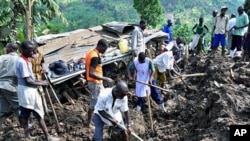As the planet marks World Water Day, thousands of people across East Africa are preparing for more devastating floods and an increase in waterborne diseases. A United Nations report released today says the destruction of the region's natural resources and an inadequate sewage structure is increasing the risk of disease.
U.N. Environment Program Spokesman Nick Nutall said the destruction of East Africa's natural water resources had led to the poor quality of the region's water.
"We believe there is a great deal that can be done by rehabilitating, renovating, conserving ecosystems," he said. "We are talking about our natural infrastructure, we are talking about our wetlands, the mangroves at the coast, because many of these are natural water filtration systems, water purification systems yet we are also losing those at an alarming rate," Nutall added.
With East Africa's long rainy season well underway, World Water Day comes as much of the region suffers from the effects of major flooding.
The rains have been unexpectedly heavy this year, displacing tens of thousands of people throughout the region.
In Uganda, the U.N. says landslides are causing heavy damage in rural areas. Around a hundred deaths have been confirmed so far in the country where floods have forced thousands from their homes.
In neighboring Kenya, humanitarian agencies say floods have displaced at least 10,000 people, mainly in the north of the country. With the rains expected to intensify throughout this week, Kenya's Meteorological Department has issued flood warnings in many low-lying areas.
It is a pattern being repeated across much of East Africa. IRIN says around 1,000 families have been displaced due to torrential rains on the border of Ethiopia and Somaliland, whilst flooding in northern Tanzania has also affected dozens of families.
Humanitarian agencies are being readied to respond to an expected hike in waterborne diseases such as cholera, which can be deadly if left untreated. The Kenya Red Cross Society is distributing water purification drugs in flood-hit areas.
During the past few years, millions of people across Kenya, Ethiopia and Somalia have been praying for rain during a devastating drought that put the region on the brink of a major humanitarian crisis.
Some parts of Kenya have had over four consecutive years without rain. But U.N. Spokesman Nutall says that although the heavy rains may help reduce the immediate effects of the drought, only a dramatic change in environmental practice can help in the long term.
"Obviously if we are getting rain then that is going to be filling up lakes and achieving some kind of restoration, but unless the forest systems are restored and conserved and indeed expanded, then the impact of low flow rivers where you get concentrations of pesticides and sewage and industrial discharges will just return," Nutall said.
The theme of this year's Water Day is 'Water Quality Challenges and Opportunities', and is designed to raise awareness about the benefits of higher water quality on the condition of both human life and the environment.












